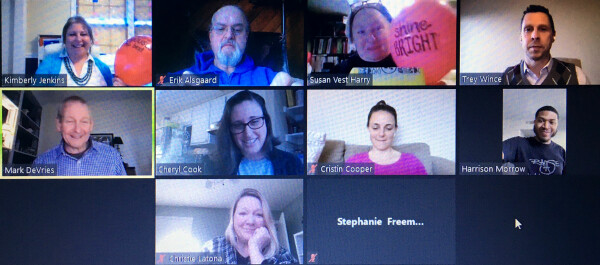BWC innovators create new realities for church
Imagination changes reality.
Since 2017, the Baltimore-Washington Conference has been involved in initiatives that empower imaginative thinking to create missional entrepreneurship. This movement uses sound and innovative business principles to ignite new ways of creating bold and innovative ministries that respond to the Spirit’s invitations.
This spring, four missional entrepreneurs completed a year-long program with Ministry Incubators, a consulting firm that empowers people to “turn hare-brained ministry ideas into sustainable impact enterprises with a theological mission.”
Susan Harry, of Reisterstown UMC, participated in the training cohort, which began just as the pandemic was starting and continued in an unprecedented time for the church.
“This was a truly fantastic experience to have this year,” she said, “when disconnection was the theme in so many aspects of life. It fueled us to press on through so many changes, but it also offered hope – hope to imagine what could be.”
Building new blueprints for ministry
 The four participants came from two BWC initiatives. The BWC’s Ministry Hatchery, held in 2019, drew 12 groups together for a 3-day intensive of design thinking and creating new ways of being church in their community. The Change Makers Initiative, funded by a Lily Grant in 2018, brought together young adults over a year-long process that included learning labs in London and San Antonio, and empowered 22 participants as they worked to discover how they “might be God’s answer to the questions their communities are asking.”
The four participants came from two BWC initiatives. The BWC’s Ministry Hatchery, held in 2019, drew 12 groups together for a 3-day intensive of design thinking and creating new ways of being church in their community. The Change Makers Initiative, funded by a Lily Grant in 2018, brought together young adults over a year-long process that included learning labs in London and San Antonio, and empowered 22 participants as they worked to discover how they “might be God’s answer to the questions their communities are asking.”
“When we see a gap between what is and what there could be, there is a moment where we can choose action or apathy, boldness or blame. The key that unlocks the move to action, instead of reverting to apathy, is imagination, the ability to see and perceive a different future,” said Shannon Hopkins, of RootedGood, a nonprofit that empowers institutions, social enterprises, and entrepreneurs to create systemic change, who served as a consultant for the BWC.
Throughout the past five years, BWC missional entrepreneurs were encouraged to “build upon the blueprint within them that seeks beauty, justice, community, and spirituality” by creating a self-funded enterprise that partners with area businesses, schools, and nonprofit, civic, and government groups.
The results of the ministries the cohort is pursuing run along the spectrum of this blueprint.
Turning one’s passion into mission
Susan Vest Harry at Reisterstown UMC started off at the Hatchery session planning to create Junction Coffee at the church and opening up the building to other community groups. The COVID pandemic made a shift necessary and she’s now working on Junction Arts and Garden, which will “use gardening to teach people to grow their own food and talk a little theology while we’re doing it.”
Kimberly Jenkins, of St. Mark UMC in Hanover, is “focused on working with women between the ages of 30 and 50 who are struggling at the intersection of politics, faith, and purpose to find their place and build community,” she said.
Harrison Morrow founded the Reach Foundation, a nonprofit to provide mentorships and scholarships to collegiate minority students.
Cristin Cooper makes homemade soup “to share as an awesome way to make friends and fight off loneliness.”
“Each of these people took their imaginations and passion and are turning them into a ministry,” said Cheryl Cook, the Baltimore-Washington Conference staff person leading the innovation initiatives. “It’s been about getting out of your box and doing what you love in a way that honors Christ and your community.”
Following the idea that the role of the church is to simply love God and neighbor, Cooper’s ministry, Coop’s Soups, has proven to be an unprecedented successful work-in-progress.
Cooper, who is a licensed local pastor, briefly explained its evolution.
“Coop’s Soups started with a ladle and a dream,” she said. “Just kidding, it actually started with loneliness.
“I noticed my interactions with others often felt rushed, shallow, and performative. I began to ask the question, ‘How could I slow down and build relationships of depth and honesty,’ beginning with inviting folks over once a week for soup and bread.
“Those first folks make up the original group of what is now Soup Church, and the soup we ate then is now Coop’s Soups. Coop’s Soups is soup to share as an awesome way to make friends and fight off loneliness. The soup’s profits support Soup Church,” she continued.
“Soup Church is church that looks more like a dinner with friends than a formal Sunday morning service,” Cooper said. “Some of the folks from Soup Church assist in making Coop’s Soups soups. For us, the practices of preparing and sharing food are encounters with God’s grace. In becoming present to the food in front of us and the people in front of us as we grow in deeper intimacy with God’s love.”
Nimble enough to pivot
Much of what the cohort has learned comes from the monthly executive coaching sessions with Ministry Incubators. They teach participants a variety of skills that enable them to define and refine their ministry and to be nimble and pivot as new opportunities and challenges arose.
The Rev. Kenda Creasy Dean, another consultant for BWC innovation initiatives, notes that 90 percent of first-time entrepreneurial ventures fail; but 80 percent of second-time ventures succeed. However, 90 percent of first-time entrepreneurs don’t try again.
The willingness of the cohort to fail and start again — to pivot — has been critical.
For Jenkins, the grace to discover God’s promptings and put them into action is possible because of the support of the cohort, she said. “Nobody ever said it’s not okay to be lost.” Harry had to completely redefine the ministry at Reisterstown, but in doing so found partners around the church that will enhance their ministry as it moves forward.
“In my ministry, pivoting is a step of faith,” Cooper said. “By pivoting, I claim I do not have the answer, and that the answer is a myth, a mirage, a valueless token when journeying with the long view. Dead ends consume my spirit when I resist pivoting. Instead, pivoting invites me to take a light grip and dance in accordance with the Spirit of Christ who leads me.”
Creating the church of our future
For Trey Wince of Ministry Incubators, who led many of the cohort sessions, missional entrepreneurship and the possibilities that faith mixed with imagination often “provide a snapshot of what ministry looks like in the future.”
After a year of monthly meetings, the cohort now meets online every three months. The BWC also invites other’s bold visions and innovative ideas for ministry to participate. For more information, contact Cheryl Cook at .
“Too often in church, people get too busy or too focused to take time to imagine,” Hopkins said. “With imagination comes creativity, risk, experimentation, and an opportunity to explore how current realities can better align with the Kingdom of God.”
Ultimately, said Christie Latona, the BWC’s director of Connectional Ministries, “It’s not what you produce, it’s who you are. … We want to create a space for imagining and dreaming with God.”


Thank you . A very informative article!